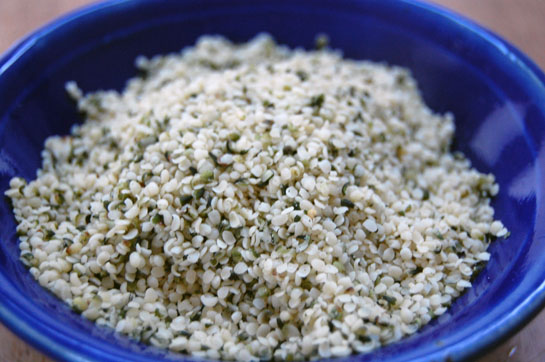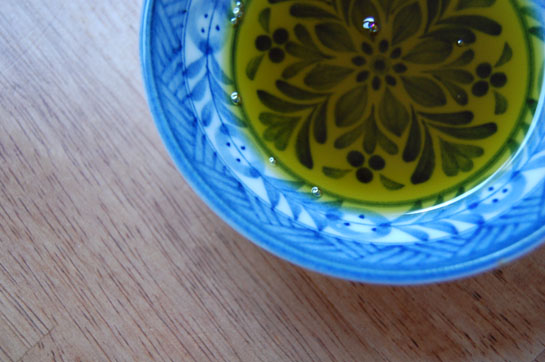
Yesterday, I briefly talked about flax. Today we will discuss hemp, and look for another post about chia seeds soon!
What do you think of when I say “hemp”? I think of marijuna and hippy homeless young women selling homemade hemp bracelets on the streets. However, hemp is appearing everywhere now in the form of hemp milk, hemp seed, hemp protein powder, etc. I decided it was time to look into the matter and see what all of the hype was about.
(I will do a food tasting review of hemp at the bottom of this page, but in case you can’t wait to find out, hemp seeds taste great-a little like pine nuts).
Benefits
Hemp is a high protein seed containing all nine of the essential amino acids (like flax). It also has high amounts of fatty acids and fiber as well as containing vitamin E and trace minerals. It has a balanced ratio of omega 3 to 6 fats at around a three to one ratio. This won’t help correct your omega balance if it’s off, but it gives you the right balance to start with.
Further the protein content of the hemp seed is supposed to be very digestible. Many people noted their personal experience of finding that hemp seed protein did not cause bloating or gas, like some of their whey, or other protein shakes did.
And, get this, unlike soy which has super high amounts of phytic acid (that anti-nutrient that prevents us from absorbing minerals), hemp seed doesn’t contain phytic acid. At the very least, this makes hemp seed a step up from soy.
The Body Ecology Diet site has an article discussing hemp here.
It contains a list of benefits including what I mentioned above plus including some others as well.
Hemp contains:
* All 20 amino acids, including the 9 essential amino acids (EAAs) our bodies cannot produce.This article claims that because hemp’s protein is in the globulin edistin form it is a superior source of protein. It ends that thought with this paragraph.
* A high protein percentage of the simple proteins that strengthen immunity and fend off toxins.
* Eating hemp seeds in any form could aid, if not heal, people suffering from immune deficiency diseases. This conclusion is supported by the fact that hemp seed has been used to treat nutritional deficiencies brought on by tuberculosis, a severe nutrition blocking disease that causes the body to waste away.3
* Nature’s highest botanical source of essential fatty acid, with more essential fatty acid than flax or any other nut or seed oil.
* A perfect 3:1 ratio of Omega-6 Linoleic Acid and Omega-3 Linolenic Acid – for cardiovascular health and general strengthening of the immune system.
* A superior vegetarian source of protein considered easily digestible.
* A rich source of phytonutrients, the disease-protective element of plants with benefits protecting your immunity, bloodstream, tissues, cells, skin, organs and mitochondria.
* The richest known source of polyunsaturated essential fatty acids.
“The best way to insure the body has enough amino acid material to make the globulins is to eat foods high in globulin proteins. Since hemp seed protein is 65% globulin edistin, and also includes quantities of albumin, its protein is readily available in a form quite similar to that found in blood plasma. Eating hemp seeds gives the body all the essential amino acids required to maintain health, and provides the necessary kinds and amounts of amino acids the body needs to make human serum albumin and serum globulins like the immune enhancing gamma globulins. Eating hemp seeds could aid, if not heal, people suffering from immune deficiency diseases. This conclusion is supported by the fact that hemp seed was used to treat nutritional deficiencies brought on by tuberculosis, a severe nutrition blocking disease that causes the body to waste away. [Czechoslovakia Tubercular Nutritional Study, 1955] “Can it make you high?
In short, no. To grow marijuna you have to have special seed that grows a plant high in THC, the property responsible for the drug response. Commercial hemp seed contains very low amounts, plus they contain a substance that counteracts THC. Dr. David West says:
“Reality: Hemp oil is an increasingly popular product, used for an expanding variety of purposes. The washed hemp seed contains no THC at all. The tiny amounts of THC contained in industrial hemp are in the glands of the plant itself. Sometimes, in the manufacturing process, some THC- and CBD-containing resin sticks to the seed, resulting in traces of THC in the oil that is produced. The concentration of these cannabinoids in the oil is infinitesimal. No one can get high from using hemp oil. ” Hemp and Marijuana:Nutiva also answers that concern
Myths & Realities
“Q:What is the difference between hemp and marijuana?
A. Marijuana and hemp both come from the same species of plant, Cannabis sativa L., but from different varieties. There are different varieties of Cannabis, just as Chihuahuas and St. Bernards are different breeds of dogs, Canis familiari.
Marijuana is the flowering tops and leaves of psychoactive varieties of Cannabis that are grown for their high THC content.
Hemp, also referred to as industrial hemp, are low-THC varieties of Cannabis that are grown for their seeds and fiber. Hemp is grown legally in just about every industrialized country except the USA”Nutiva, as well as other companies, are part of the “Test Pledge”. It’s a pledge that their products won’t have amounts of THC in them that would cause someone to fail a drug test.
Was it Historically used as a food?
One thing is clear. Hemp has been grown for a long time. It may even be one of the first crops. Hemp was used for making paper, clothes, and ropes and oil for lamps. But was it produced for food, or was it simply eaten in times of famine?
It looks like it was definitely used as a medicine for a variety of uses. The Chinese especially utilized hemp seed for medicine. Go here for some of the historical medicinal uses of hemp seed.
This quote gives a good overview of some of the information I found about the historical uses of hemp as food.
“The use of hemp for food and medicine may be as old as the human race itself. Recent interest in the seed arises from the awareness of the nutritional need for omega-6 and omega-3 essential fatty acids, as well as the need for cheap sources of protein to feed a burgeoning population in Asia and the developing world. In addition to its nutritional value, hemp seed has demonstrated positive health benefits, including the lowering of cholesterol and high blood pressure.
In the second century, Galen recorded that some people enjoyed eating fried hemp seeds with their desserts. As recently as the 1950′s in Southern Africa, mothers of the Sotho tribe served the ground seed “with bread or mealie-pap” to children during weaning. Human uses of hemp seed for food are naturally found in India where the oil is pressed to provide a table oil, and in Russia where the oil is made into a kind of hemp butter or margarine.
In Europe, it was once required of monks that three meals made of hemp seed were eaten daily, whether in soups, gruel, or porridges. In the belief that the spirits of dead relatives visit every Christmas Eve, the Polish and Lithuanian people prepared them a soup of hemp seed which was called “semieniatka”. The Ukrainian and Latvian people made a similar offering on the day of Three Kings. In China, hemp seed was consumed by farmers in the north and the seed were listed as a famine food for the starving multitudes of China near the end of World War II. Australians also used the seed during two famines in the nineteenth century.
SourceToday’s hemp seed products are being developed on the working premise of that which can be done with flax seed and soy beans might also be applied to hemp seed. Very basic food preparation, and the processing techniques have been the start of such seemingly remarkable foods as a hemp seed tofu and a low fat cheese substitute that even melts and stretches like real cheese.”
I felt like the historical use of hemp as a food seems about as high as the case for flax historically being used as a food (some people think that flax was just a “famine food” as well.)
Ending Thoughts
I would like to give hemp a chance, but would like to see more long term studies done on hemp before I add it into my daily diet. It does seem like the Chinese consumed it for a long period of time, and that reassures me. I would just like to read a little more about the long term effects of eating it often. Like flax, I wonder if hemp seed is really meant to be consumed on a constant basis in the form of hemp milk, hemp cheese and hemp protein shakes. That seems to be taking moderation out of the picture.
I don’t like overly processed foods, so if we were to start adding in hemp seed, it would be in the form of hemp seeds, pure and simple. I also don’t think that hemp should replace your animal protein sources-but that doesn’t mean it couldn’t have a place in your diet. One last note, I mentioned yesterday that flax was high in phytoestrogens (in fact, even higher than soy), from what I can tell from my reading, hemp either doesn’t contain any phytoestrogens or very little. (One article said it has some and a bunch of others claimed it didn’t have any). I will try to keep my eye out for more information about hemp and flax.
Hemp Product Review
This post was really inspired by some samples of Nutiva’s hemp products. I had received some of their Organic Coconut Oil (which is great) and some of their different hemp products which they generously gave me. I have been impressed with the quality of products we received from them. Here are some of my thoughts on the samples I received.
Hemp Seeds
Their hemp seed taste great! A very nutty, almost sweet taste. I would have to say that it tastes almost like a pine nut, but a bit more mellow. I can imagine it would be great in a variety of dishes.

Hemp Oil
This has a slightly nutty flavor and lightly green color (similar to some olive oil in color). I could imagine adding it to a salad dressings, but not using just hemp oil for the oil part.
Organic Hemp and Flax Seed Bars
These were delicious. Sweetened only with honey, they were just perfect in their level of sweetness. Of course, none of the seeds in these bars are soaked and dehydrated, but they sure were good! All three of us liked them. If it wasn’t for the enzyme inhibitors in seeds, I would definitely like to have these bars around for a quick bite on the run.
No comments:
Post a Comment